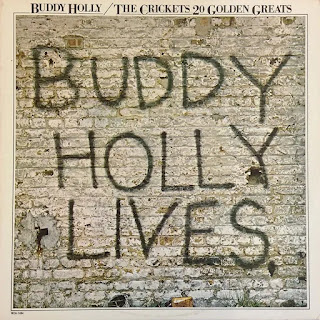166. Buddy Holly, "20 Golden Greats"
Just after midnight on February 3, 1959, Buddy Holly, Richie Valens, and J.P. Richardson got into a chartered Beechcraft Bonanza with pilot Roger Peterson, following a show in Clear Lake, Iowa. Th plane climbed, then unexpectedly began a sharp turn and descent, crashing into a nearby cornfield and killing everyone on board. Buddy Holly was 22 years old.
What he accomplished, perfectly encapsulated in this 20-song, 44-minute record, is almost undescribable. These songs are the backbone of rock and roll, the DNA that still exists, in some form or other, in almost everything you listen to today. Buddy Holly co-wrote "Not Fade Away," for Chrissakes (although it owes a big debt to Bo Diddley, whose eponymous song Holly covers on this record too). He is credited with popularizing the two-guitar, bass, drum band format that has become the de facto rock standard. He was in the very first group of inductees into the Rock and Roll Hall of Fame (which, I know, but still).
"Everyday," the fourth song in this collection, is driven almost entirely by Holly's vocal, a gentle, music-box melody, with the only percussion from Jerry Allison slapping his leg. Holly digs into his voice more in songs like "It's So Easy," getting a growl going that Linda Ronstadt would pick up on in her famous 1977 cover. In fact, so many of these songs have been covered so many times that this collection is like a basic rock template. And he wrote or co-wrote almost all of them! That's the wild part to me. So many of the early rock guys played songs written by others, but Holly was a prolific songwriter who also played his own material.
A lot of the songs have that cheery, bright feel that you associate with early rock, like "Peggy Sue," of course, and "Rave On," but then there's a song like "Well...All Right," which has a lyrically positive message ("Well all right, well all right/Our lifetime of love will be all right") but has an unmistakeable feeling of longing and sadness that makes you wonder if he really believes it. Just a gorgeous song. And "Peggy Sue Got Married," a sequel to the original "Peggy Sue" is inherently sad in that he's lost his true love. "Peggy Sue," btw, was a real person actually named Peggy Sue, who was the girlfriend and future wife of drummer Allison.
Because Holly was so foundational to rock, there is so much to say, but I'll leave it with this: when the Beatles (who named themselves in honor of Holly's band the Crickets) made their famous appearance on the Ed Sullivan show in 1964, John Lennon asked the CBS coordinator about Holly's performance on the show. That's right; the Beatles are in the midst of revolutionizing popular music, and Lennon wants to fanboy out over Buddy Holly.
Does this album deserve to be in the Top 500? Subject to my misgivings about putting collections on the list, of course.




Comments
Post a Comment